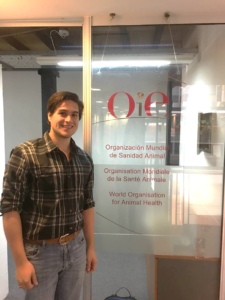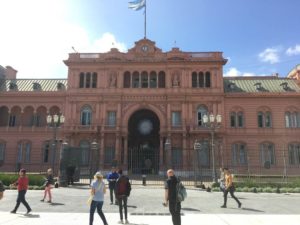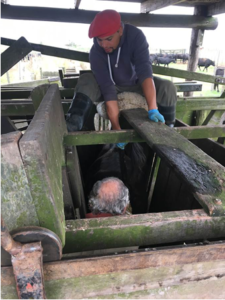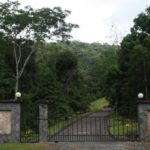 Four years ago, I was preparing to start veterinary school come fall. I was excited about the new journey ahead. I was most excited because I had developed an interest in the public service side of veterinary medicine during my time in undergrad, and I was eager to explore a field with seemingly endless options.
Four years ago, I was preparing to start veterinary school come fall. I was excited about the new journey ahead. I was most excited because I had developed an interest in the public service side of veterinary medicine during my time in undergrad, and I was eager to explore a field with seemingly endless options.
Fast forward 3.5 years. I have had amazing opportunities to truly explore different sides of veterinary medicine. I worked with a dairy veterinarian in Valencia, Spain and participated in a veterinary public health short course in Padova, Italy. I joined the life-changing Smith-Kilborne Class of 2017, became an executive committee member of the International Veterinary Students’ Association, and had an externship at the headquarters of the Food and Agriculture Organization in Rome, Italy. I have learned how veterinarians are an important pillar of agriculture and maintaining human public health. I have seen how veterinarians have a major impact in some of the most remote regions of the globe. I have even been able to meet other veterinary students, from all over the world, eager to pursue a similar career in the public sector.
In March of 2019, I was about to start my last major externship of my veterinary student career. I had been lucky enough to meet Dr. Luis Barcos–the World Organization for Animal Health’s (OIE) Regional Director for the Americas. After talking about my goals and what I would hope to gain, he said he would like to help me come to his home country of Argentina, including a visit to the OIE office there. It was an opportunity I could not pass up. I was lucky enough to be participating in a fourth year curriculum that gave me externship time to pursue valuable experiences such as this.
 It was a fantastic opportunity to learn a new culture, as well as practice my Spanish. Dr. Barcos worked it out so I could spend almost a month with a former classmate of his who works in rural Argentina as a general (primarily beef) practitioner; then I would go to Buenos Aires to spend time at the OIE Office. I was able to see firsthand the similarities and differences between veterinary practice (beef cattle in particular) in Argentina and Texas–two of the largest beef producers. I vaccinated for Foot-and-Mouth disease, used Brucella Strain 19, worked in different management systems, and attended a local brucellosis management meeting. None of this would have been possible if I had not been encouraged to explore areas outside of Texas and my own comfort zone.
It was a fantastic opportunity to learn a new culture, as well as practice my Spanish. Dr. Barcos worked it out so I could spend almost a month with a former classmate of his who works in rural Argentina as a general (primarily beef) practitioner; then I would go to Buenos Aires to spend time at the OIE Office. I was able to see firsthand the similarities and differences between veterinary practice (beef cattle in particular) in Argentina and Texas–two of the largest beef producers. I vaccinated for Foot-and-Mouth disease, used Brucella Strain 19, worked in different management systems, and attended a local brucellosis management meeting. None of this would have been possible if I had not been encouraged to explore areas outside of Texas and my own comfort zone.
At the Buenos Aires OIE office, I was able to see how such a small, but hard working, group of people are able to manage two whole continents of animal health data, striving towards a more agriculturally secure future. I was fortunate to be able to visit both the local veterinary faculty in Buenos Aires as well as the one across the Río de la Plata in Montevideo, Uruguay. It was amazing to see how much they are able to do there with less than what our schools in the USA have. They were also shocked to hear about some of the things we have, and surprised to find out that in the USA students are not required to go through a rotation at a slaughterhouse.
 After 5 weeks, it was time to come home. I returned to school and finished out my remaining rotations at Texas A&M College of Veterinary Medicine & Biomedical Sciences. I graduated in early May and am officially now a doctor of veterinary medicine. I have managed to see a part of veterinary medicine during my time in school that some never get the chance to experience. Veterinary medicine in the United States has changed a lot. While Texas A&M began because of a tick wreaking havoc on the beef industry, today Rhipicephalus annulatus and R. microplus have a much smaller role in students’ lives…within one parasitology lecture. However, the work veterinarians do in the public sector is no less important today than it was in 1916. I was fortunate to be able to gain these experiences, in part thanks to Dr. Jan Suchodolski and the IPAC group at Texas A&M for the travel grant they awarded me. I hope through their work students will continue to gain this kind of valuable experience that is not currently present otherwise in our curriculum, and continue to support the public sector of the veterinary profession.
After 5 weeks, it was time to come home. I returned to school and finished out my remaining rotations at Texas A&M College of Veterinary Medicine & Biomedical Sciences. I graduated in early May and am officially now a doctor of veterinary medicine. I have managed to see a part of veterinary medicine during my time in school that some never get the chance to experience. Veterinary medicine in the United States has changed a lot. While Texas A&M began because of a tick wreaking havoc on the beef industry, today Rhipicephalus annulatus and R. microplus have a much smaller role in students’ lives…within one parasitology lecture. However, the work veterinarians do in the public sector is no less important today than it was in 1916. I was fortunate to be able to gain these experiences, in part thanks to Dr. Jan Suchodolski and the IPAC group at Texas A&M for the travel grant they awarded me. I hope through their work students will continue to gain this kind of valuable experience that is not currently present otherwise in our curriculum, and continue to support the public sector of the veterinary profession.

